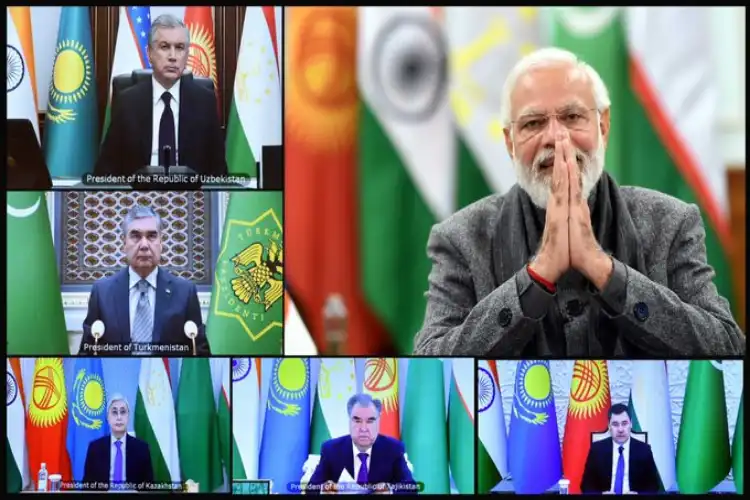
New Delhi
India cemented its relations with five central Asian countries – Kazakhstan, Kyrgyzstan, Tajikistan, Turkmenistan and Uzbekistan – at the first-ever India-Central Asia Summit ending with a Delhi declaration that seeks to expand cultural and trade exchanges and making the world terror free.
India agreed to offer a special portion of the Chabahar Port, built by India in Iran, for use of the five central Asian countries. The declaration announced setting up of a joint working group of work out modalities of the use of the port by these countries.
Besides Indian Prime Minister Narendra Modi, the signatories to the Delhi declaration are: Kassym-Jomart Tokayev (Kazakhstan), Sadyr Japarov (the Krgy Republic ), Emomali Rahmon (Tajikistan), Gurbanguly Berdimuhamedov (Turkmenistan), and Shavkat Mirziyoyev (Uzbekistan).
The day-long summit was held digitally on the occasion of the 30th anniversary of the establishment of diplomatic relations between India and Central Asian countries. The leaders agreed to issue joint postal stamps to mark the occasion and early recognition of the Covid vaccines to resume travel from India to these countries.
Recalling the centuries-old close civilizational, cultural, trade and people-to-people linkages between India and Central Asian countries, the declaration said the leaders looked forward to building a long term, comprehensive, and enduring India-Central Asia partnership based on mutual trust, understanding and friendship.
An India – Central Asia Centre will be set up in Delhi. Besides several multilateral for a will also be set up to increase interactions between different sections of societies of India and central Asian countries.
The 36-point Delhi declaration is all encompassing document covering cooperation in all the fields of economy, trade culture, including Indian films, students exchange, technological cooperation and healthcare sector. These countries invited the Indians healthcare entities to set up hospitals in their countries.
The Delhi declaration aims at institutionalizing mechanisms for cooperation be it in trade, solar power energy, healthcare including dealing with Covid-19 situation or cooperation between the Parlimentarians. It also lays emphasis on creating a seamless travel routes across Asia to promote travel and trade.
The Indian side welcomed the interest of Central Asian countries to utilize the services of Shahid Beheshti Terminal at Chabahar Port for facilitating their trade with India and other external markets. The Sides agreed to continue engagement for further developing the transit and transport potential of their countries, improving the logistics network of the region and promoting joint initiatives to create regional and international transport corridors. The Central Asian countries
Prime Minister Modi’s "Support of All, Development for All, Trust of All, Efforts of All” was enunciated as the mantra for regional development, peace and prosperity. “The Leaders agreed that global development should be human-centric to ensure that no one is left behind. In this context, the Leaders supported a more collaborative and inclusive global progress and development,” it read.
The Central Asian Leaders praised India for offering its scholarships to their citizens in capacity building and human resource development its offer to organize professional training programmes for diplomats from the Central Asian countries at the Sushma Swaraj Institute of Foreign Service in New Delhi.
The Leaders noted that the current level of trade and investments between India and Central Asian countries is far from realizing its true potential and stressed on the importance of making concerted efforts to boost trade and investment in sectors like medicine, healthcare, pharmaceuticals, education, information technology, business process outsourcing (BPO), infrastructure, agriculture and processing of agricultural products, energy, space industry, textiles, leather and footwear industry, gems and jewelry etc.
The Leaders emphasized on harnessing the tourism potential that exists in their countries and underlined the need for increasing tourist arrivals, including for pilgrimage as well as historical and cultural tourism, creating tourism trails across the region, encouraging investment in tourism infrastructure and organizing regular tourism conferences and seminars etc. In this context, the Leaders noted the holding of the 25th session of the General Assembly of the World Tourism Organization in 2023 in Samarkand. The Central Asian countries invited the Indian film industry to explore and use the picturesque countryside locations in their countries for film shootings.
The leaders agreed to host regular Film Festivals, cooperation between museums, translation of literary work, digitization of manuscripts, restoration work related to cultural heritage, etc. Given the commonality of words used in India and the Central Asian countries, the Indian side proposed to commission a ‘Dictionary of Common words used in India and Central Asian countries’ and showcasing of a Buddhist exhibition in the Central Asian Countries.
The Leaders condemned terrorism in all its forms and manifestations and reiterated that providing support, using terrorist proxies for cross-border terrorism, terror financing, arms and drugs trafficking, dissemination of a radical ideology and abuse of cyber space to spread disinformation and incite violence, goes against the basic principles of humanity and international relations. They agreed that terrorism must be comprehensively countered to achieve a "World free of Terror.”
The Central Asian Leaders stressed the importance of further universalization of the Code of Conduct towards Achieving a World Free of Terrorism, which for the first time acknowledged the interconnection between security, combating terrorism and development, thus facilitating the advancement of the Sustainable Development Goals.
The Leaders called for early adoption of the UN Comprehensive Convention on International Terrorism.
